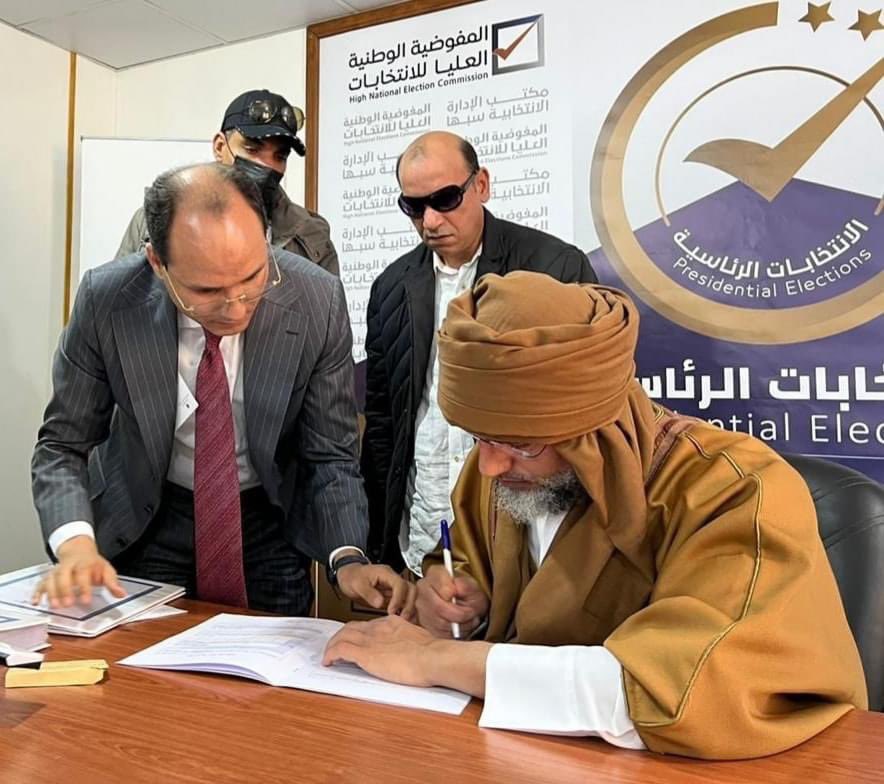Libya’s High National Electoral Commission (HNEC) must ensure that alleged perpetrators of serious human rights violations be barred from running in the 24 December 2021 elections, the International Commission of Jurists (ICJ) said today.
Allowing alleged perpetrators of crimes under international law, including Saif al-Islam Gadhafi, to run in the presidential and parliamentary elections would be catastrophic for accountability efforts and the prospects of transitional justice in the country, and would violate Libya’s obligations under international law.
“Impunity won’t bring stability in Libya”, said Said Benarbia, Director of the ICJ’s Middle East and North Africa Programme. “Libyans deserve justice for past and present crimes, and the political process cannot set aside this imperative.”
On 14 November 2021, Saif al-Islam Gadhafi registered as a candidate in the presidential elections. On 28 July 2015, Gadhafi was convicted in absentia by the Tripoli Court of Assize on charges related to actions undertaken to supress the 2011 uprising, including killings, and was sentenced to death. The proceedings failed to comply with international fair trial standards. On 27 May 2021, the Libyan Supreme Court annulled the judgment and ordered a re-trial.
On 27 June 2011, the International Criminal Court (ICC) issued an arrest warrant against Gadhafi on charges of murder and persecution as crimes against humanity. He has remained at large since, and Libya has so far failed to hand him over to the ICC for trial. Libya has obligations under international law to enforce the ICC arrest warrant, whatever the outcome of the presidential elections.
Moreover, on 16 November 2021, Khalifa Haftar, the Commander of the Libyan Arab Armed Forces (LAAF, formerly Libyan National Army, LNA), announced that he would also participate in the presidential competition.
The UN Independent Fact-Finding Mission on Libya has documented how the LAAF/LNA may have committed serious violations of international humanitarian law, including war crimes, such as the indiscriminate targeting of civilians.
The ICC issued a warrant for the arrest of Mahmoud Al-Warfalli, an LNA Brigade Commander, for the war crime of murder. However, Al-Warfalli was never prosecuted or handed over to the ICC and remained at large until his death in March 2021. As a commander, Haftar may be held accountable for failing to prevent, repress or refer to the competent authorities crimes under international law committed by persons under his control.
“Gadhafi and Haftar must face justice, not stand in Libya’s elections”, Benarbia said. “Libyan authorities should immediately hand Gadhafi over to the ICC and investigate alleged crimes by forces under Haftar’s command.”
It is paramount that Libyan elections be free, fair and fully inclusive of all components of society. To secure such an outcome, the Libyan authorities must repeal Decree 286/2019, which imposes overly severe restrictions on civil society organizations, and may hinder their essential role in the run-up to the elections, including the monitoring of the fairness and transparency of the process. Moreover, the HNEC is imposing additional requirements for organizations to act as electoral observers, which may discourage many civil society actors to take up that role.
“Civil society actors are key to a successful electoral process in Libya, and the Government of National Unity must ensure their full, unimpeded participation in such a process”, Benarbia said.
Contact
Said Benarbia, Director, ICJ Middle East and North Africa Programme, t: +41-22-979-3817; e: said.benarbia(a)icj.org
Asser Khattab, Research and Communications’ Officer, ICJ Middle East and North Africa Programme, e: asser.khattab(a)icj.org
Background
On 6 June 2018, Saif al-Islam Gadhafi filed an admissibility challenge with regard to the proceedings against him before the ICC. He argued that his case inadmissible under articles 17(1)(c) and 20(3) of the Rome Statute (principle of ne bis in idem) because (i) he had already been tried by the Tripoli Court of Assize (The State of Libya v. Saif al-Gadhafi, Abdullah al-Senussi & Others, Case No. 630/2012) and (ii) he benefitted from the amnesty adopted under Law No. 6 of 2015.
Law No. 6 of 2015, which was issued by Libya’s House of Representatives in 2015, grants a “general amnesty to all Libyans” for crimes committed from 15 February 2011 until 7 September 2015, except for (i) terrorism; (ii) drug trafficking; (iii) sexual crimes; (iv) murder, abduction, forced disappearance and torture; (v) hudud crimes (criminal acts under Islamic law), when reported; and (vi) corruption and corruption-related crimes (articles 1 and 3). The Law requires a number of procedural conditions to be met, after which the decision whether or not a person may benefit from the amnesty rests with the judge competent to adjudicate the case.
On 9 March 2020, the ICC Appeals Chamber upheld the Pre-Trial Chamber I’s rejection of Gadhafi’s application, findingthat “the Pre-Trial Chamber did not err in finding a lack of finality of the Tripoli Court Judgment, and that Law No. 6 is not applicable to the crimes for which Mr Gaddafi was convicted.” This conclusion is confirmed by the Libyan Supreme Court annulment, on 27 May 2021, of the judgement of the Tripoli Court of Assize and the ordering of a retrial.
The case against Gadhafi before the ICC, therefore, continues to be admissible.





